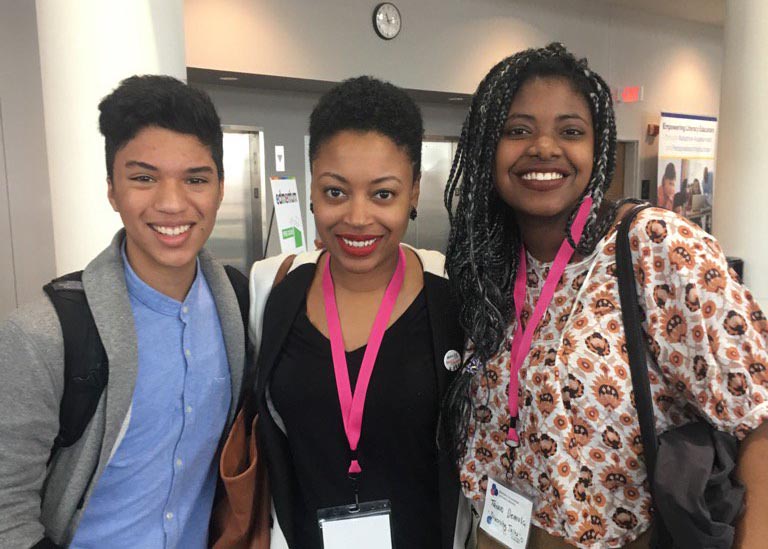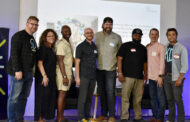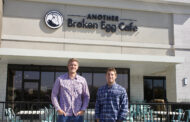Conversations about race, power, privilege and oppression are being had across the country every day.
And Kiara Butler believes there is no better group to lead these discussions than young people, she said.
“Students are already having these conversations every day,” said Butler, co-founder and CEO of Diversity Talks. “It’s the adults that don’t necessarily want to. They may be kind of iffy about having a conversation because they don’t want to say the wrong thing. Students are more receptive to opening up.”
When you have your whole life ahead of you, it’s hard not to feel particularly affected by current events, Butler said. Butler co-founded Diversity Talks in June 2017 with the objective to create space for important conversations and to empower students.
The Providence, Rhode Island-based program was recently selected for the Lean Lab, a Kansas City-based education tech accelerator. The student-led program is focused on providing culturally relevant professional services, offering such workshop topics as LGBT studies, implicit bias, microaggressions, intersectionality and others.
“These conversations don’t necessarily take place in the classroom,” Butler said. “But they have a very strong impact on the social and emotional learning environment for students and teachers.”
Diversity Talks selects students grades nine through 12 to lead diversity training workshops for educators of all backgrounds. Butler’s decision to put students in a position of leadership is often questioned, she said.
“It’s a pretty tough question to answer when you have so many people who believe that students are not capable of getting in front of teachers and teaching them something,” she said. “One of Diversity Talks’ core values is that educators must be willing to relinquish their power. It’s pushing educators to reach that level of vulnerability to sit back and learn something.”
The new startup has already piloted a workshop in Rhode Island and announced in August it has launched training services in Kansas City. On Wednesday, Diversity Talks is working with Turn the Page KC, the KCMO Health Department and Mayor Sly James’ Office at the School Suspension Summit. The startup flew in two high school facilitators from Rhode Island to talk about implicit bias and suspension rates.
“A lot of people say there’s not a correlation between student-teacher relations and suspension rate,” Butler said. “But I have a very strong belief that there is. If there were stronger relationships between teachers and students, suspension rates would go down.”
Participating in this workshop aligns with Diversity Talks’ mission, she said. The startup is currently seeking partnerships with school districts that have high suspension rates, high chronic absenteeism rates for students and teachers, high teacher turnover and a student-teacher diversity gap.
“When you put these things together in a nutshell, the target market ends up being urban schools,” Butler said. “But many people sometimes don’t realize that even urban districts can have a student-teacher diversity gap, which is why student-led programming is so important.”
The idea for Diversity Talks was born via a Startup Weekend in Providence in 2016. The firm’s acceptance into the Lean Lab program represents one of Diversity Talks’ biggest growth opportunities since establishing itself as an LLC, which Butler said was validating.
But with opportunity comes challenges. While doing business in Missouri, Butler said she has had to adjust to differing demographics.
“When I first pitched Diversity Talks, I pitched it as ‘Hey, I’m black. I’m a lesbian. I’m a woman.’ I want to focus on intersectionality,” Butler said. “In Rhode Island I felt like most people understood that, but in Missouri I’ve felt a little bit of pushback — not everyone understood what that means. I was told by some that I couldn’t talk about race in that way. … That made me a little uncomfortable.”
Intersectionality is a sociological term defined as the overlapping of social identities as they relate to systems of oppression and is the idea that an individual can have multiple identities. After some self reflection, Butler said she realized that all the pushback did was reinforce the need for conversations that Diversity Talks brings.
“I’ve learned you have to tweak your communication to fit the audience you’re presenting to,” she said. “It was a shift in mindset for me. … Not everyone is where I am when it comes to talking about race, power and privilege. In order to get them there, I have to meet people where they are and then walk that path together.”
Diversity Talks is currently in conversation with several Kansas City area school districts in hopes to establish a partnership. By the end of the Lean Lab program, Butler’s goal is to have contracts with four area school districts to offer ongoing professional development and to raise venture capital.
“There are so many aspects of society that I believe Diversity Talks can impact,” Butler said. “I can’t wait to see where things are a year from now and what things have changed in Kansas City.”








































